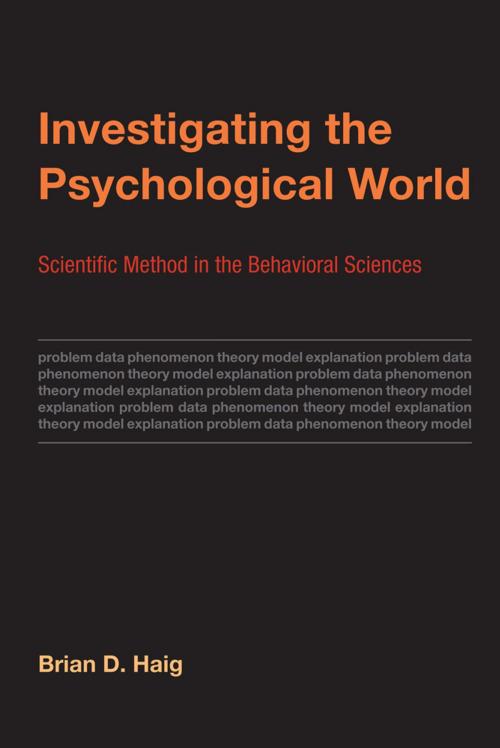Investigating the Psychological World
Scientific Method in the Behavioral Sciences
Nonfiction, Health & Well Being, Psychology, Research, Cognitive Psychology| Author: | Brian D. Haig | ISBN: | 9780262322386 |
| Publisher: | The MIT Press | Publication: | April 4, 2014 |
| Imprint: | A Bradford Book | Language: | English |
| Author: | Brian D. Haig |
| ISBN: | 9780262322386 |
| Publisher: | The MIT Press |
| Publication: | April 4, 2014 |
| Imprint: | A Bradford Book |
| Language: | English |
A broad theory of research methodology for psychology and the behavioral sciences that offers a coherent treatment of a range of behavioral research methods.
This book considers scientific method in the behavioral sciences, with particular reference to psychology. Psychologists learn about research methods and use them to conduct their research, but their training teaches them little about the nature of scientific method itself. In Investigating the Psychological World, Brian Haig fills this gap. Drawing on behavioral science methodology, the philosophy of science, and statistical theory, Haig constructs a broad theory of scientific method that has particular relevance for the behavioral sciences. He terms this account of method the abductive theory of method (ATOM) in recognition of the importance it assigns to explanatory reasoning. ATOM offers the framework for a coherent treatment of a range of quantitative and qualitative behavioral research methods, giving equal treatment to data-analytic methods and methods of theory construction.
Haig draws on the new experimentalism in the philosophy of science to reconstruct the process of phenomena detection as it applies to psychology; he considers the logic and purpose of exploratory factor analysis; he discusses analogical modeling as a means of theory development; and he recommends the use of inference to the best explanation for evaluating theories in psychology. Finally, he outlines the nature of research problems, discusses the nature of the abductive method, and describes applications of the method to grounded theory method and clinical reasoning. The book will be of interest not only to philosophers of science but also to psychological researchers who want to deepen their conceptual understanding of research methods and methodological concerns.
A broad theory of research methodology for psychology and the behavioral sciences that offers a coherent treatment of a range of behavioral research methods.
This book considers scientific method in the behavioral sciences, with particular reference to psychology. Psychologists learn about research methods and use them to conduct their research, but their training teaches them little about the nature of scientific method itself. In Investigating the Psychological World, Brian Haig fills this gap. Drawing on behavioral science methodology, the philosophy of science, and statistical theory, Haig constructs a broad theory of scientific method that has particular relevance for the behavioral sciences. He terms this account of method the abductive theory of method (ATOM) in recognition of the importance it assigns to explanatory reasoning. ATOM offers the framework for a coherent treatment of a range of quantitative and qualitative behavioral research methods, giving equal treatment to data-analytic methods and methods of theory construction.
Haig draws on the new experimentalism in the philosophy of science to reconstruct the process of phenomena detection as it applies to psychology; he considers the logic and purpose of exploratory factor analysis; he discusses analogical modeling as a means of theory development; and he recommends the use of inference to the best explanation for evaluating theories in psychology. Finally, he outlines the nature of research problems, discusses the nature of the abductive method, and describes applications of the method to grounded theory method and clinical reasoning. The book will be of interest not only to philosophers of science but also to psychological researchers who want to deepen their conceptual understanding of research methods and methodological concerns.















